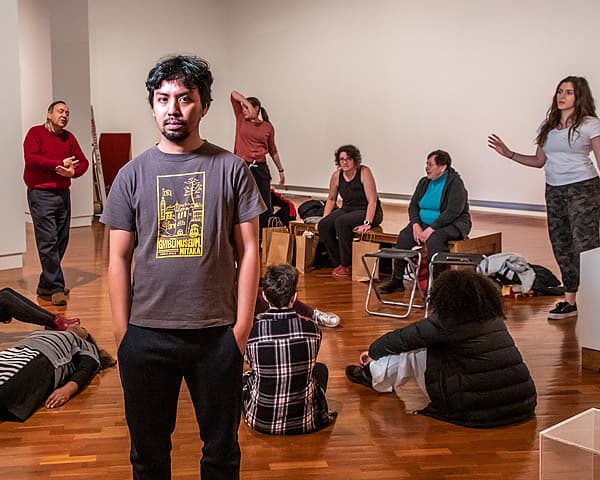Duto Hardono
An experimental musician and sound artist, Duto Hardono investigates the possibilities of how sound is presented within a gallery context, often performing his works with found objects and analogue technology. Variation & improvisation for ‘In harmonia progressio’
2016–17 is an instructional vocal game piece where the artist invites groups of people to transform the ‘white cube’ of museums and galleries into a space for radical audio interruptions. The instructions are simple yet infinitely complex in their different interpretations and iterations. Hardono engages 12–15 vocal ‘actors’ to interpret aurally and to express physically the words ‘in, harmonia, progressio’. These words are repeated, much like a tape loop, to form a unique vocal composition. Like a game of Chinese whispers, the original instructions are interpreted and then broken down to form unexpected new meanings.
While this morphing of sound into new forms is nothing new in the world of sound art, the agency that is handed over to interpretation by different communities of people, with different cultural backgrounds, is what differentiates the work. Every time it is interpreted and performed it essentially becomes a new vocal score.
In recent years, sonic works in galleries and museums have been gaining more attention through the current focus on live art practices and the unearthing of the historical connections between visual art and sound. However, while this connection is acknowledged, it is still surprising to find durational live works in museum spaces, whose purpose is generally to preserve and display art, not always to activate it. Presenting live performance works in sanctioned spaces, then, can be seen as a radical departure from the white cube’s intention.
In Indonesian contemporary art practice, art can happen anywhere—on the side of a road, in share houses, in nature, in cafes and restaurants—with minimal emphasis on the ‘where’ and maximum attention on the ‘what’. The most important aspect of art making is that you share your work with your community, seek support and invite people to engage. This democratisation of art is what Indonesian contemporary art practice does best and is an important approach to bring to international art discourse.
Kristi Monfries

Duto Hardono
